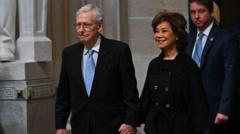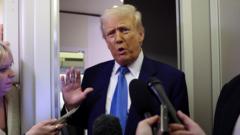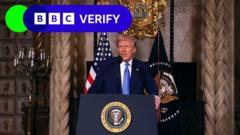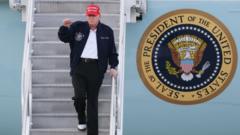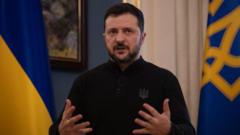As European leaders gather to address the ongoing conflict in Ukraine, Sir Keir Starmer highlights the essential role of the US in guaranteeing effective deterrence against potential Russian aggression.
**Starmer Advocates for US Support in Crafting Ukraine Peace Agreement**
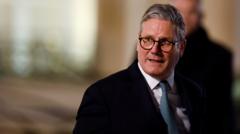
**Starmer Advocates for US Support in Crafting Ukraine Peace Agreement**
UK Prime Minister emphasizes need for US involvement to ensure lasting security for Ukraine amid European summit discussions.
Sir Keir Starmer, UK Prime Minister, has articulated that any potential peace agreement concerning Ukraine will necessitate a "US backstop" aimed at deterring future Russian threats. This statement was made following a rapid meeting with European leaders at the Élysée Palace in Paris, where the implications of the upcoming peace talks led by the Trump administration were examined. Starmer indicated his willingness to discuss the fundamental aspects of a peace deal with President Trump during their meeting next week in Washington, suggesting that a strong US security assurance is pivotal for deterring Russia.
This summit was convened promptly after comments from US Defense Secretary Pete Hegseth, emphasizing that Europe must take more responsibility for its own security amidst rising tensions brought on by Russia. Starmer stressed that it was crucial for Europe to step up its defense capabilities and spending. He mentioned the possibility of deploying UK troops to Ukraine as part of a multinational force, although he acknowledged that this would require significant increases in defense allocations.
While European leaders expressed solidarity on security issues, some voiced concerns over the Trump administration's decision to engage in peace talks with Russia unilaterally. Ukrainian President Volodymyr Zelensky underscored that Ukraine had not consented to these discussions, calling into question the legitimacy of any outcomes reached without Ukrainian participation. US officials have signaled an intention to consult European nations on the matter, albeit indirectly.
Experts, however, have raised doubts about the feasibility of deploying an effective multinational force capable of deterring Russia. General Sir Adrian Bradshaw and Malcolm Chalmers emphasized that any such force would need to be well-armed and substantial enough to act decisively. They highlighted the need for comprehensive support structures and substantial troop numbers, with estimates of around 100,000 troops being necessary to secure a credible presence in Ukraine.
Danish Prime Minister Mette Frederiksen and European Commission President Ursula von der Leyen have echoed calls for increased defense spending across Europe, reflecting a growing consensus on the urgency of addressing security challenges posed by Russia. Despite this, German Chancellor Olaf Scholz deemed discussions around troop deployments as "premature," suggesting a more cautious approach to military involvement.
As fighting continues in Ukraine, with civilian casualties reported from Russian strikes over the weekend, the situation remains precarious. European leaders, including Poland's Donald Tusk, have pledged military and humanitarian support for Ukraine without committing to troop deployments.
Starmer's trip to Washington, termed a vital opportunity for UK interests, remains overshadowed by the challenges of forging a unified European response to the ongoing crisis. Wrapped in complex geopolitics, the next steps for peace in Ukraine hinge significantly on international dialogue and cooperation, particularly with American partners in the lead.
This summit was convened promptly after comments from US Defense Secretary Pete Hegseth, emphasizing that Europe must take more responsibility for its own security amidst rising tensions brought on by Russia. Starmer stressed that it was crucial for Europe to step up its defense capabilities and spending. He mentioned the possibility of deploying UK troops to Ukraine as part of a multinational force, although he acknowledged that this would require significant increases in defense allocations.
While European leaders expressed solidarity on security issues, some voiced concerns over the Trump administration's decision to engage in peace talks with Russia unilaterally. Ukrainian President Volodymyr Zelensky underscored that Ukraine had not consented to these discussions, calling into question the legitimacy of any outcomes reached without Ukrainian participation. US officials have signaled an intention to consult European nations on the matter, albeit indirectly.
Experts, however, have raised doubts about the feasibility of deploying an effective multinational force capable of deterring Russia. General Sir Adrian Bradshaw and Malcolm Chalmers emphasized that any such force would need to be well-armed and substantial enough to act decisively. They highlighted the need for comprehensive support structures and substantial troop numbers, with estimates of around 100,000 troops being necessary to secure a credible presence in Ukraine.
Danish Prime Minister Mette Frederiksen and European Commission President Ursula von der Leyen have echoed calls for increased defense spending across Europe, reflecting a growing consensus on the urgency of addressing security challenges posed by Russia. Despite this, German Chancellor Olaf Scholz deemed discussions around troop deployments as "premature," suggesting a more cautious approach to military involvement.
As fighting continues in Ukraine, with civilian casualties reported from Russian strikes over the weekend, the situation remains precarious. European leaders, including Poland's Donald Tusk, have pledged military and humanitarian support for Ukraine without committing to troop deployments.
Starmer's trip to Washington, termed a vital opportunity for UK interests, remains overshadowed by the challenges of forging a unified European response to the ongoing crisis. Wrapped in complex geopolitics, the next steps for peace in Ukraine hinge significantly on international dialogue and cooperation, particularly with American partners in the lead.


